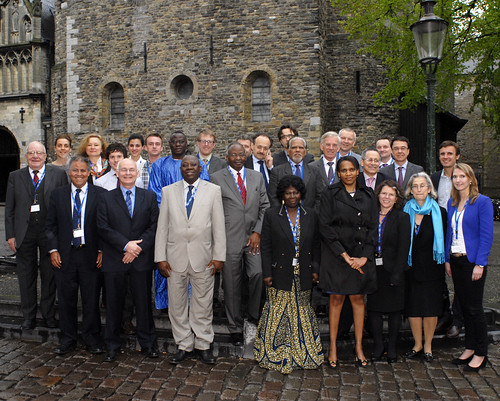
by Clem Silverman.
The European Centre for Development Policy Management (ECDPM) facilitated an informal high-level seminar on future perspectives for Africa-EU and ACP-EU relations.
Bringing together senior officials from both ACP, African and EU institutions and member states, as well as members of the Board and staff of ECDPM, the seminar provided participants with an opportunity to engage in an open and frank discussion under the Chatham House rule on emerging dynamics in the global landscape of international cooperation and their particular implications for the longstanding relationship between Africa-EU and ACP-EU.
This blog post is a summary of some of the key points raised, and contains multi-media taken from the margins of the event. Below, you’re able to watch an exclusive interview with the new ACP General Secretary, Alhaji Muhammad Mumuni; Deputy Director-General for Policy and Thematic Coordination at the European Commission, Klaus Rudischhauser; and Koen Vervaeke Director for Horn of Africa, Southern Africa and the Indian Ocean for the European External Action Service (EEAS). A slideshow of images from the event is also below.
Key points
For future partnerships the EU cannot count on development assistance and aid to form relations, future cooperation should make a radical shift away from the traditional donor-recipient logic. Dialogue in the future ought to be based around clearly set out agendas with each party, be it EU, Africa or within the ACP, declaring their own interests. This means that the EU should be more straight forward in expressing its foreign interests and similarly the ACP should take ownership of its agenda – even going as far to say that the Group should reinvent itself. Alhaji Muhammad Mumuni, Secretary General of the ACP said that there is “some kind of reflection” on the status of the Group in this interview given on the fringes of the event:
There was discussion about the added value of the EU in international cooperation. It was broadly agreed that emerging actors currently engage in a different and more visible way with Africa. Long-term EU support may indeed be less visible than prestigious infrastructure projects and investments in extractive industries. An EU perspective, however, is that this long-term engagement with its African partners will allow countries to realise their own development agenda, working bottom-up, combining economic growth with long-term capacity development and engagement with grassroots organisations. This is what Koen Vervaeke from the European External Action Service outlined in an interview after the meeting. He answers questions about how an economic crisis in Europe impacts on the relationship, as well as how to deal with emerging economies, adding that “Africa should recognise the specific added value we as Europeans bring to them”
In this next ECDPM video, Klaus Rudischhauser, Deputy Director-General for Policy and Thematic Coordination at the European Commission, talks about where and how EU development assistance should be targeted. He says money should be given to those countries most in need, and that other forms of development initiatives — such as domestic resource mobilisation — should be used in upper-middle income countries. Development assistance is “seed money to drive processes, to promote reform and to assist the country in implementing those reforms.” He says that the Commission will “produce a policy document – before the summer – showing the relative contribution and importance of the various sources of financing”
Other topics at the seminar included:
Overcoming the patchwork of overlapping policy frameworks – there is a current unsustainable and ineffective overlap of EU strategies in the ACP, in Africa and in the various sub-regions, is perceived to be ineffective and confusing for all parties involved. The consensus favours a regional approach, and keeping the contractual nature of the the legally binding Cotonou Partnership Agreement (CPA). That is one of the key differences and value added, compared to other EU cooperation arrangements or regional strategies that are merely political documents.
Addressing the elephant in the room: the way forward with the Economic Partnership Agreements (EPAs). There is increasing recognition among EU, African and ACP representatives that the EPA-saga has soured both ACP-EU and Africa-EU relations, with positions not being expressed clearly enough from all parties on what they want from the EPAs. Yet there there are no real alternatives, such as Free Trade Agreements, that offer the advantages of EPAs.
ACP Secretary General Mumuni alluded to, moving ahead with the reflection process on future ACP-EU cooperation in the video interview above. Any future cooperation will require a change of mind-set, away from an aid-centred donor-recipient logic to one aimed at economic win-wins, shared interests for joint international positioning and enhanced political dialogue on issues of mutual concern, with Africa as the EU’s extended neighbourhood.
Read the full report here on Post 2015 and beyond 2020: What new perspectives for Africa-EU and ACP-EU relations?
------------------------
Clem Silverman is a Communications Assistant at the ECDPM.



0 comments :
Post a Comment